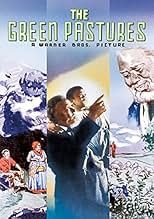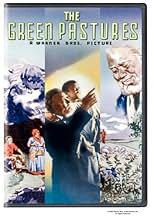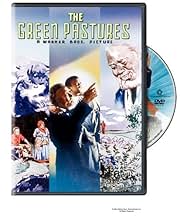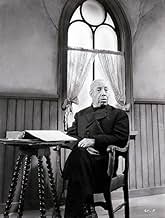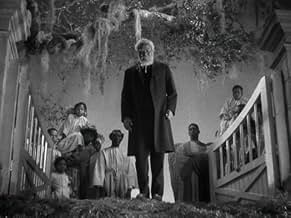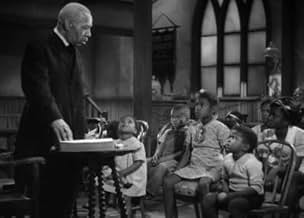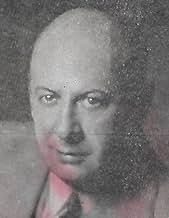God, heaven, and several Old Testament stories, including the Creation and Noah's Ark, are described supposedly using the perspective of rural, black Americans.God, heaven, and several Old Testament stories, including the Creation and Noah's Ark, are described supposedly using the perspective of rural, black Americans.God, heaven, and several Old Testament stories, including the Creation and Noah's Ark, are described supposedly using the perspective of rural, black Americans.
- Directors
- Writers
- Stars
- Awards
- 4 wins total
Eddie 'Rochester' Anderson
- Noah
- (as Eddie Anderson)
Frank H. Wilson
- Moses
- (as Frank Wilson)
Edna Mae Harris
- Zeba
- (as Edna M. Harris)
Charles Andrews
- Flatfoot
- (as Chas. Andrews)
Billy Cumby
- Abraham
- (as William Cumby)
- …
- Directors
- Writers
- All cast & crew
- Production, box office & more at IMDbPro
Featured reviews
When you pop either THE GREEN PASTURES or HALLELUJAH in your DVD player, Warner Brothers' disclaimer comes up, stating these films "are a product of their time.... it does not express Warner Brothers' opinion....." Okay, they're setting the record straight. They want to present two excellent movies, without offending anyone. The "warning" is eclipsed by two factors. These two films, both with all black casts, showcase amazing talent often smothered by the then Hollywood studio system. They also both carry a message of faith told in a very entertaining manner.
THE GREEN PASTURES opens with a Sunday School sermon in the deep south. The classroom is made up of attentive black children asking some pretty intelligent questions about the Bible. We peek into one child's view of heaven. Since this child probably knows very little of the world outside her community, heaven is one big fish-fry with plenty to eat, where the adults get to hangout and smoke ten-cent "see-gars".
It's here where God (referred to in the film as "De Lawd") makes an appearance. This is an Oscar worthy performance by Rex Ingram, one of many black actors at the time who seldom received decent film work from Hollywood. Ingram plays "De Lawd" in a sweet, soft-spoken manner, never talking down to the humans he created. "Now you're just doing fine," he tells Adam. "But there's just one thing missing. You need a family." Ingram's quiet tone always tells us this guy has things in order. Film fans may remember Rex Ingram as Jim in HUCKLEBERRY FINN (1939) and as the laughing, constantly sarcastic genie in THE THIEF OF BAGDAD (1940). Not only was Ingram an accomplished stage actor, but he was a certified MD as well!
Ingram also plays Adam and Hezdrel. During the later performance, GREEN PASTURES most memorable time-tested message comes across very simply. We realize this is truly a cinematic classic. The Bible stories are depicted here in pseudo 20th century settings with old world behavior. (Much like the villages in the first three FRANKENSTEIN films) Moses is a modern-day "trickster" who gives Pharaoh's top magician a run for his money. In another scene, a pistol packing gangster in a double breasted suit mouths off to Noah.
THE GREEN PASTURES opens with a Sunday School sermon in the deep south. The classroom is made up of attentive black children asking some pretty intelligent questions about the Bible. We peek into one child's view of heaven. Since this child probably knows very little of the world outside her community, heaven is one big fish-fry with plenty to eat, where the adults get to hangout and smoke ten-cent "see-gars".
It's here where God (referred to in the film as "De Lawd") makes an appearance. This is an Oscar worthy performance by Rex Ingram, one of many black actors at the time who seldom received decent film work from Hollywood. Ingram plays "De Lawd" in a sweet, soft-spoken manner, never talking down to the humans he created. "Now you're just doing fine," he tells Adam. "But there's just one thing missing. You need a family." Ingram's quiet tone always tells us this guy has things in order. Film fans may remember Rex Ingram as Jim in HUCKLEBERRY FINN (1939) and as the laughing, constantly sarcastic genie in THE THIEF OF BAGDAD (1940). Not only was Ingram an accomplished stage actor, but he was a certified MD as well!
Ingram also plays Adam and Hezdrel. During the later performance, GREEN PASTURES most memorable time-tested message comes across very simply. We realize this is truly a cinematic classic. The Bible stories are depicted here in pseudo 20th century settings with old world behavior. (Much like the villages in the first three FRANKENSTEIN films) Moses is a modern-day "trickster" who gives Pharaoh's top magician a run for his money. In another scene, a pistol packing gangster in a double breasted suit mouths off to Noah.
I realize that many modern audiences might be turned off by this film due to the politically correct times we live in--probably moreso for the religious references than for the racial stereotypes. Nonetheless, it's a genuine feel-good movie full of love, kindness, and yes, morality. I'd first read the play for a drama class many years ago, and I was absolutely stunned by it, although I figured that I'd never get to see a production of it. Imagine my delight finding it in the video store and actually taking all of it in. BTW--regarding the racial issues here: it continually amazes me how so many people in the African-American community would find this film and "Song of the South" offensive, yet these same people praise Nelly for "Pimpin'" and Ludicrous touting "Ho's in the bedroom." Maybe I'm missing something here, but I don't like itwhen whites tout ghetto stereotypes, and it's just as offensive to me when blacks do it. Yet, we MUST protect the children from "Green Pastures" and "Song of the South" because they perpetuate "racist stereotypes." Okay, I'm off my soap box--rent this film--it's a masterpiece.
I've never seen a movie like this. It's probably one of the most interesting Biblical movies I've ever seen. I'm black and I didn't think it was too offensive, considering the time period that it came from. In fact, my whole family liked it. This is one movie you really have to give a chance before you watch it. Unfortunatelly, movies like this and Disney's "Song of The South" are thrown among the wayside so they won't "corrupt" our "politically correct" society.
10Greg-83
I first saw "The Green Pastures" quite by accident as a 13 year-old while visiting grandparents in Detroit, Michigan many, many years ago...I never forgot it.
Years later, in college, while on a date, I was telling my date about it and we stopped by the school library so I could find a copy of the play to show her...she loved it, too. I've since bought the tape and watch it every now-and-then when I want to smile and feel good.
I remember asking my mom about the movie when I first saw it and always remembered her response..."how do you think the little black children in the movie pictured God and others in the Bible?" And that, of course, is exactly what Marc Connelly was trying to get us to think about.
Though the original play/movie may have met resistance in the South, it was a hit in New York. To the eternal historical revisionists of today who see nothing but stereotypes and negative images, I'd suggest you take another look.
Country folk of the early part of this century did talk with accents and few had much education (whites as well as blacks). The dialog of the film is less a contrived stereotype than it is a snapshot of what the simple life was like. It's not hard for me to imagine a dedicated Mr. Deshee teaching kids in Sunday School about the good book. Nor is it hard to understand why they might picture pharoe's guards in double-breasted suits like the gangsters in the news of their youth, or relating any number of other scenes to what was familiar to them.
Connelly was not trying to convert viewers to religion...he was trying to get those already converted to see the personal relationship with God enjoyed by all his children, regardless of their station in life.
There are no whites in the movie, just as there were no whites in the immediate community where the story takes place. This movie was not made with the burden of every social dilemma we've struggled with over the years. To blindly force modern perceptions and racial baggage on it does nothing but dampen the simple joy of this unique gem.
Years later, in college, while on a date, I was telling my date about it and we stopped by the school library so I could find a copy of the play to show her...she loved it, too. I've since bought the tape and watch it every now-and-then when I want to smile and feel good.
I remember asking my mom about the movie when I first saw it and always remembered her response..."how do you think the little black children in the movie pictured God and others in the Bible?" And that, of course, is exactly what Marc Connelly was trying to get us to think about.
Though the original play/movie may have met resistance in the South, it was a hit in New York. To the eternal historical revisionists of today who see nothing but stereotypes and negative images, I'd suggest you take another look.
Country folk of the early part of this century did talk with accents and few had much education (whites as well as blacks). The dialog of the film is less a contrived stereotype than it is a snapshot of what the simple life was like. It's not hard for me to imagine a dedicated Mr. Deshee teaching kids in Sunday School about the good book. Nor is it hard to understand why they might picture pharoe's guards in double-breasted suits like the gangsters in the news of their youth, or relating any number of other scenes to what was familiar to them.
Connelly was not trying to convert viewers to religion...he was trying to get those already converted to see the personal relationship with God enjoyed by all his children, regardless of their station in life.
There are no whites in the movie, just as there were no whites in the immediate community where the story takes place. This movie was not made with the burden of every social dilemma we've struggled with over the years. To blindly force modern perceptions and racial baggage on it does nothing but dampen the simple joy of this unique gem.
I watched this movie late at night with a bunch of munchkins and wondered why more of the adults didn't come watch it with us... It is a unique, well-made, unassuming, enjoyable, surprising, well-told "story." I say "story," because it is a description more than a tale of one way to conceive of the "Lawd of heaven." Gotta love the southern accents. They did a great job and left me rethinking the way I thought of things and smiling as I thought of the way they portrayed it all. It was also curious to me to see how society's perception of music, race, and Sundays has changed, but how some things never change.
Favorite quote... by "The Lawd" - "I'm going ta make me a miracle"
Favorite quote... by "The Lawd" - "I'm going ta make me a miracle"
Did you know
- TriviaThe studio's anxiety about this film's all-Black cast is evident in the film's 3:48 minute trailer. It consists of white actor Dick Powell talking directly to the camera, white workers preparing costumes and props, and author Marc Connelly explaining the rationale for the bare sets to a studio executive. According to Connelly, it is how a "simple, devout" people would imagine heaven. At no time are Rex Ingram or any of the film's other stars shown in the preview, and there is only a brief sequence of black extras in a long shot.
- GoofsOne of Noah's son's rides a zebra that is clearly a donkey or mule made to look like a zebra. Two real zebras are loaded while he rides the fake.
- Crazy creditsGod appears in many forms to those who believe in Him. Thousands of Negroes in the Deep South visualize God and Heaven in terms of people and things they know in their everyday life. The Green Pastures is an attempt to portray that humble, reverent conception.
- ConnectionsEdited into Governing Body (2023)
- SoundtracksHave You Got Good Religion (Certainly, Lord)
(uncredited)
Traditional spiritual
Performed by the Hall Johnson Choir
- How long is The Green Pastures?Powered by Alexa
Details
- Runtime1 hour 33 minutes
- Color
- Sound mix
- Aspect ratio
- 1.37 : 1
Contribute to this page
Suggest an edit or add missing content



